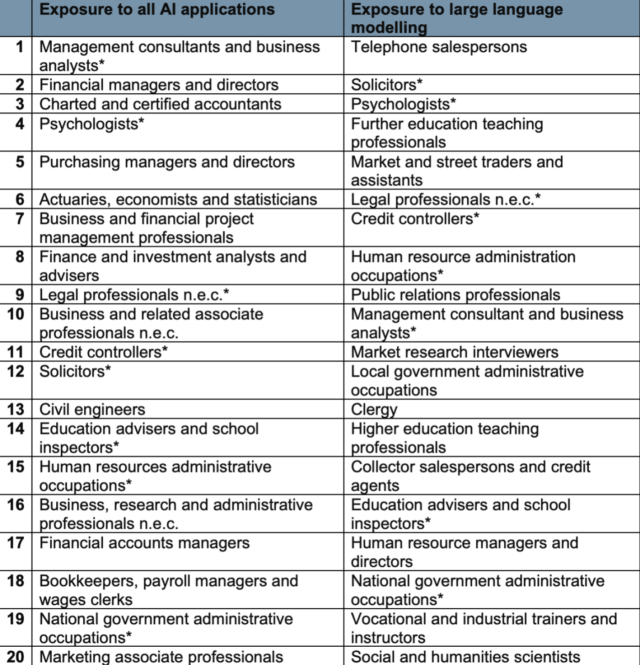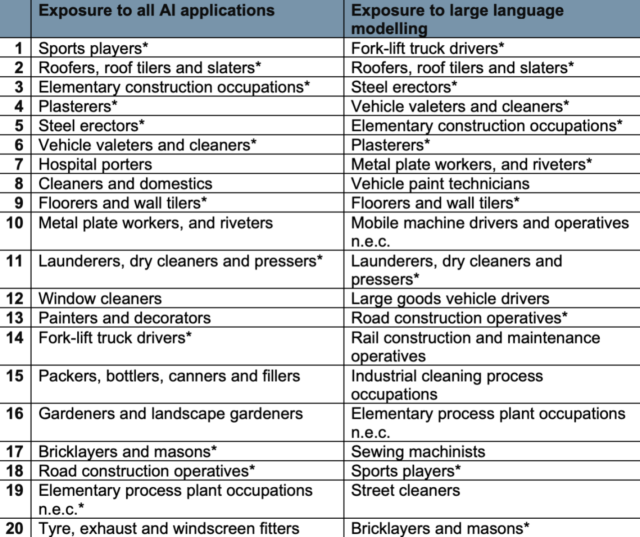From Lifehacker:
The question of whether AI will eventually take jobs away from us meatbags is nothing new. However, following ChatGPT’s launch late last year, the speed at which AI has caught on has surprised almost everybody, even those working in the space. And far from a question to consider in the far-off (or even near-term) future, jobs are already being affected: Some layoffs this year came due to companies believing AI could replace certain roles, while other companies froze hiring for similar reasons.
So, how do you know if your job is one of the ones at risk? A recent study could give you the answer (and you might not like it).
This UK study reveals the jobs “most exposed” to AI—and what that means
Assessing the random actions of various companies and getting lost in speculation do us no good. For a substantive and thoughtful discussion on the topic, there is already traditional research ongoing into how AI will affect the job market, including this recent study out of the U.K. The study, developed by the UK’s Department for Education, estimates that 10–30% of jobs are automatable with AI—which, depending on your general outlook on AI, may sound like a lot, or less than you’d expect.
The study investigated the job functions and qualifications for various sectors of the workforce, looking for whether the following ten AI applications could aid in those jobs:
- Abstract strategy games
- Real-time video games
- Image recognition
- Visual question answering
- Image generation
- Reading comprehension
- Language modeling
- Translation
- Speech recognition
- Instrumental track recognition
Depending on how relevant each of these 10 functions were to a particular role, the study generated an AI Occupational Exposure (AIOE) score for the role. The higher the score, the more “exposure” that role may have to artificial intelligence.
In the initial findings, the study determined that “professional occupations,” including sectors like finance, law, and business management, tended to be more exposed to AI. In fact, they specifically found that the finance and insurance sectors were the most exposed. Building off this discovery, it seems the more advanced the qualifications necessary for the role, the more AI exposure that role tends to have. In general, if your job requires more education and more advanced training, chances are it pairs with well AI.
The reverse is true, of course—except for security guards, interestingly enough. The study says there is such an emergence of security technology that although the role requires low education and work experience, it is more exposed to AI than other jobs of its kind.
None of this is necessarily a bad thing. As the study points out, the International Labor Organization has found most jobs are only partially exposed to AI, so the odds are decent employees in these roles will benefit from AI exposure, rather than have their jobs fully replaced by the technology.
Which jobs are most exposed to AI
Taking all this into consideration, the study breaks down the top 20 occupation types most exposed to AI, as well as most exposed to large language modeling (LLMs). It’s a long list, including sectors like consulting, telephone sales, psychologists, legal professionals, teachers, and payroll managers.

As stated above, the study finds that finance and insurance are the most exposed to AI of any job sector. The other most exposed sectors include information and communication; professional, scientific and technical, property; public administration and defense; and education.
Just as interesting as the list of occupation types most exposed is the list of those least exposed. Many of these roles require manual labor that cannot be replicated by AI or technology in general, such as sports players, roofers, fork-lift truck drivers, painters, window cleaners, and bricklayers:

. . . .
Will AI truly replace any jobs, according to the study?
Interestingly enough, the study is almost exclusively focused on AI exposure, rather than on jobs threatened by the technology. That said, they do have a list of 16 job types that are considered “high automation occupations,” which a pessimist could infer to mean jobs that could be one day replaced by automation.
- Authors, writers and translators
- Bank and post office clerks
- Bookkeepers, payroll managers and wages clerks
- Brokers Call and contact centre occupations
- Customer service occupations n.e.c.
- Finance officers
- Financial administrative occupations n.e.c
- Human resources administrative occupations
- Librarians
- Market research interviewers
- Other administrative occupations n.e.c.
- Pensions and insurance clerks and assistants
- Telephone salespersons
- Travel agents
- Typists and related keyboard occupations
You might notice some overlap between this list and the list of jobs most exposed to AI. That’s because the study notes that these jobs all have high AIOE scores, both for exposure to AI and LLMs.
Link to the rest at Lifehacker
How expensive is it to run AI datacenters?
Microsoft is looking to nuclear reactors:
https://www.windowscentral.com/microsoft/microsoft-is-reportedly-eyeing-nuclear-energy-for-its-ai-ventures-following-the-techs-exorbitant-power-consumption
Preferably, fusion.
Again, I doubt LLM “creative” writing is going anywhere.
Speaking of Europe’s AI limitations, they have yet to produce a single world class AI tool in the one year ChatGPT has been publicly available but they just passed their first attemot to bell the cat:
https://www.cnbc.com/2023/06/14/eu-lawmakers-pass-landmark-artificial-intelligence-regulation.html
“During a critical Wednesday vote, the Parliament adopted the AI Act with 499 votes in favor, 28 against and 93 abstentions. The regulation is far from becoming law, but it is likely to be one of the first formal rules for the technology globally.
European Parliament members agreed to bring generative AI tools like ChatGPT under greater restrictions. Generative AI developers will be required to submit their systems for review before releasing them commercially.”
“Earlier in the day, Github CEO Thomas Dohmke called on European regulators to listen to the private sector, as it pushed ahead with rules for AI.
“We encourage the European Union and the US government to move really fast and listen to those that built the technology, not only in the commercial business, but also in universities, in the open-source communities,” Dohmke told CNBC’s Arjun Kharpal.”
We’ve all seen this before with internet commerce, with ebooks, with space launch systems: bureaucrats and media siding with the politically connected entrenched powers to try to prevent or delay the arrival of new technologies…and failing.
They are trying to regulate an emerging field before they understand what it is, how it is used, and where it is going. Good luck with that.
They missed the single most valuable “AI” application: Big Data analysis.
Companies have been collecting massive hoards of data for close to 30 years and now they have the tools to mine the data for non-obvious correlations. It is where the real gold rush in using LLMs lies, what companies like MS and AWS are (succesfully) selling: the ability to create custom models and apps based on the customers secret inhouse data.
Looking at the list of occupations “exposed” to “AI” and it is easy to see they also missed the true driver of “exposure”: ROI. AI apps aren’t cheap. They need (for now) massive datacenters to host the models that assemble the end user apps. Spending all that money on low return niches like creative writing is just silly.
Finally, the source of the study betrays its biases: the UK is mortally afraid of losing its financial busineses that made London one of the world’s top financial hubs so yes, they would list financial services in all its forms as being at risk. No need for any study to know there are big gains from *assisting* humans sifting big data, but just like with writing, human judgement is required to use such tools. Other than day traders and “Boiler Rooms” the losses there will be at the low end.
Lost in the AI angst is the reality that AI is a big tech software field. It requires massive capital, even bigger infrastructure, and experienced enterprise software developers. Plus a limited bureaucratic regime.
The UK isn’t quite as bad off as the rest of Europe in those areas but their CMA is working hard to catch up:
https://www.windowscentral.com/microsoft/google-asks-uk-cma-to-regulate-microsofts-azure-business
At a time Microsoft is looking to invest $3B in AI-focused Datacenters in the UK, the bureaucrats there are looking to make such an effort less worthwhile. Still angry at being outmanuevered in the Activision deal, I suppose.
(FWIW, Microsoft is investing $50B in datacenters worldwide. And still netting $100B free cash flow. So much for the old MS is dead mantra.)